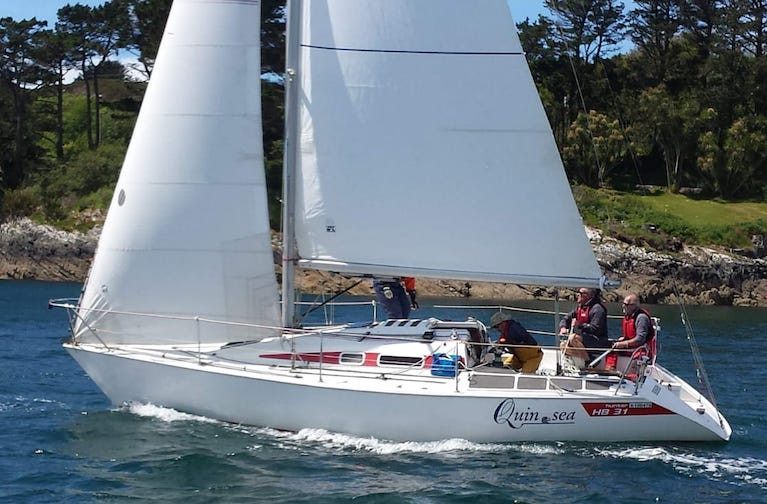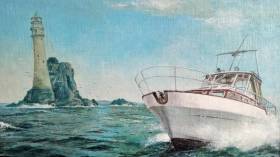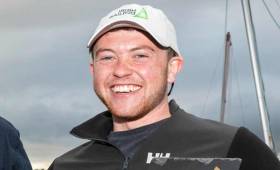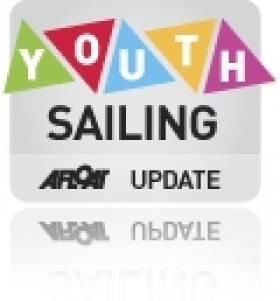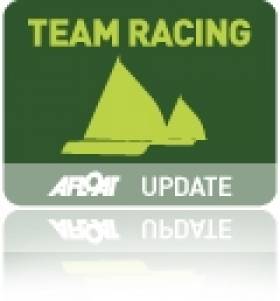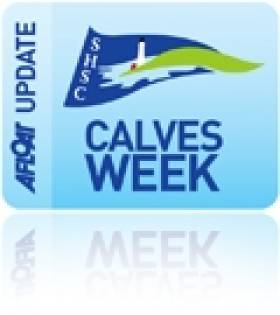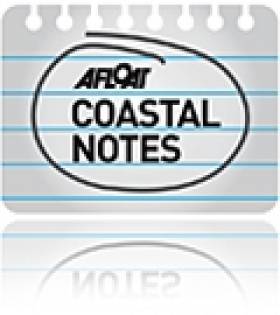Displaying items by tag: Schull Harbour Sailing Club
Schull Harbour Sailing Club Fastnet Race Line Honours for Aidan Heffernan's Indulgence
The annual Schull Harbour Sailing Club Fastnet Race attracted 17 entries last Saturday. Starting from the harbour line in a 10-knot northerly breeze the fleet were able to carry their kites all the way to the rock in near-perfect sea conditions.
However, the return trip proved more problematic as the falling breeze became more cyclonic coupled with the falling tide.
Line honours went to Aidan Heffernans Indulgence who was the only boat to finish in under four hours, while the Echo division winner was the Quinlan family sailing Quinsea with Club commodore Flor O'Riordan winning IRC in Big Cheers.
 Part of the 17-boat Schull Harbour fleet racing to the Fastnet Rock Photo: John Dalton
Part of the 17-boat Schull Harbour fleet racing to the Fastnet Rock Photo: John Dalton
Fastnet ’79: A Personal Recollection Of A Terrible Night From Skipper & Crew Of ‘Flicka’
Unseasonable gales in August have little meaning for those who experienced a terrible night that month in 1979, on the third day of that year’s Fastnet Race, as the skipper and crew of Flicka recall.
The morning after the hurricane hit, it was the lead story around the world. For a small group of Schull Harbour Sailing Club members, it was just a lucky escape.
In Schull that afternoon, fellow sailors and newsmen armed with cameras and seasick pills were going to watch the Fastnet Race frontrunners round the rock.
Michael Murphy — our skipper — and wife Derval, together with Mick Barnett, Steve Cone and the Collins girls were keen to go.
Frank Boland had offered them the use of his 36ft heavy displacement motor cruiser Flicka, and suggested that the two older members of his family, Mary and John, would come along. They headed for sea with a picnic, a bottle of grog for the crew — and a warning to be careful from harbour master Jimmy Reilly.
As Flicka nosed into the bay, the other boats were returning. Past Long Island, the swell deepened and the boat bounced to the Fastnet Rock. A feast was consumed on board, and as the cruiser hung around, head to wind off the lighthouse, dusk descended, with the onset of heavy rain and an ever increasing wind. In hindsight it was fortunate there was no marine radio on board, as to the east the horror of the night was beginning.
Many years later, while attending a book launch for The Lightkeeper, author Gerald Butler confirmed that he was on duty on the Fastnet that night and was trying to contact Flicka on the VHF, and eventually when he lost sight of her navigation lights he called Baltimore lifeboat, which immediately launched, but was then diverted to the Irish yacht, Ken Rohan’s Regardless which was in serious danger, having lost her steering off the Staggs.
In hindsight it was fortunate there was no marine radio on board, as to the east the horror of the night was beginning
The mystery of the boat described in his book was all the more intriguing when he discovered that the owner, Frank Boland, was one of the Commissioners of Irish Lights who had overall responsibility for the operation of the Fastnet.
Having turned for home, the full force of the storm hit — together with the realisation of the vessel’s unsuitability for the weather, with the following sea in danger of swamping the boat.
The sing-song provided a little comfort, while all eyes peered through the darkness as the nearer to Schull they motored, the more serious the situation became.
In the harbour, the wind was beyond gale force and appeared cyclonic in direction, hitting the hull from all angles. The raindrops were like thimbles flying upwards into a night that was as black as a witch’s hat. Shapes whirled in the water and lights faded in and out as the screen wipers thwacked.
Through prisms of water, Steve Cone on the bow pointed out the lights of a yacht battling its way up Long Island Sound, which subsequently turned out to be Ted Crosbie, who hugged the island shore for shelter all night. Steve’s face, lit by the bow navigation lights that matched his green oilskins, made him look like the Incredible Hulk.
With Schull pier underwater and a chaotic scene developing for the yachts lining the pier wall, it was decided to try for Flicka’s moorings. Here, Mary Boland played her ace card, managing to locate the mooring buoys. Mick Barnett and Steve managed to hook it at the first attempt, but were unable to hold on when struck by a particularly powerful gust, losing the only boathook on board. A quick search located a hooked-on boarding ladder with which Steve, lying over the bow, managed to secure the mooring, while Mick Barnett held onto his legs for dear life.
Shapes whirled in the water and lights faded in and out as the screen wipers thwacked
For Flicka’s crew, the danger was increasing. Disembarkation was to be a nightmare. Spouse was separated from spouse, sibling from sibling; if the worst happened, no family would endure a double tragedy.
Boarding the rubber dinghy was like riding a panicking porpoise and every yard travelled shipped a gallon of water. Three seemingly endless journeys landed everyone back to the pier, where the rafted yachts were splintering together while one leg of Peter Jay’s catamaran lay like a beached whale on the head of the pier.
The last to abandon Flicka was Michael Murphy, with Mick Barnett helming the dinghy. On shore, everyone tried to track them in the impenetrable darkness. Lamps were waved back and forth and names called … no sign. The only noise above the wind was the sound of children crying on the rafted yachts.
A horror began to insinuate itself into the minds of the watchers. As their senses verged on the possibility of loss, familiar voices suddenly boomed from the darkness. The little outboard engine had finally given up the ghost and the dinghy had been driven into the shingle beach in the Acres. The short walk, the hugs and laughter brought blessed relief.
The wind dropped off gradually about 4am and as the early dawn rose, both sailors and fisherman met in the metallic light to witness the havoc, only then to learn the fate of those who had encountered the demon in the night.
Patrick O’Reilly has also shared his memories of that fateful night in August 1979:
I was a 10-year-old with my late father, Barry O’Reilly — ex-Dragon sailor and ex-Tritsch-Trasch of Howth — as well as Dr Maurice O’Keeffe, Arabella O’Keeffe and Morgan Sheehy, all of Kinsale, when we left Schull Harbour on August 13th, 1979. We were on Flor O’Dowd’s beautiful 35ft ketch, with Maurice O’Keeffe at the helm.
All day, the sea state at the Fastnet was oily and sloppy. Sitting around at the Fastnet for the day caused almost all of us sea sickness which, as I remember, was fully cured by Campbell’s tomato soup and white sliced pan from O’Dowd’s bakery in Kinsale.
We saw both Ted Turner’s Tenacious and Bob Bell’s Condor round the Fastnet. My 10-year-old self definitely got a triumphal wave from Turner, the ‘mouth of the south’.
I remember well the change in weather around dusk. We surfed the following sea to the mouth of Schull Harbour. We must have got in to the harbour earlier than Flicka as we did not have the same screaming wind that they had and got ashore without incident.
That night we stayed in the East End Hotel. The hotel had the VHF wired to a tannoy, which broascast the drama of Ted Crosbie (was he sailing a Sadlier?) in Long Island Sound and indeed that of others. It was both real and surreal at the same time...
Liam Manning is November’s “Sailor of the Month (Inshore)
With the year drawing to a close, it looked as though Liam Manning of Schull would be seen as 2017’s ultimate bridesmaid, as he was crew for Fionn Lyden’s All-Ireland Sailing victory in October.
But the dark days of November came up trumps for Manning – he captained the all-conquering University College Cork team to overall victory in the mid-November Intervarsities team racing in Baltimore, keeping a formidable array of talent in line.
Calves Week 30th Birthday Party Details Announced
#schull – Commodore of Schull Harbour Sailing Club Tadgh Dwyer set out the details of the 30th Cork Dry Gin Calves Week Sailing Festival from 5 – 8 August 2014 at Blackrock Castle in Cork city.
Dwyer pointed out that Calves Week is one of the largest annual sailing festivals on this island, attracting boats every year from around the island. "The attraction of Cork Dry Gin Calves Week has always been the strong mix of great sailing among and around the islands of Roaringwater Bay and the family entertainment held ashore."
Boats travel to Schull from clubs around Ireland for Calves Week every year to take advantage of sailing conditions not available elsewhere.
Rui Ferreira, who is responsible for delivering the Calves Week programme this year, emphasised that the 1000 Carbery Isles laid out in Roaringwater Bay play a major part bringing sailors back every year. "It is a significant additional part of the challenge for sailors that they have to deal with islands as marks, instead of managing a "round the cans" course. Islands come with rocks, currents, wind shadows and a host of other problems. When you sail in a Calves Week race, you can be competing as much with nature as with the other boats in your class. But a race with the Fastnet Rock as a racing mark is hard to beat."
At the same time the Committee has been focused on ensuring that boats can participate in the Regatta at a reasonable cost. "Entry fees have been maintained at the same rate for some years but more importantly by consolidating the racing days to 4 consecutive days in a single week, it makes it much easier for crews to be available, book houses locally for their families, and so on."
Dwyer added "This is as much an event for families as for sailors and that has been a significant part of the attraction of this sailing festival over the last three decades. This year the ashore programme will be hugely boosted by the local Regatta Committee which is putting together a great programme to celebrate the 130th anniversary of Schull Regatta the Sunday after Calves Week. We will be working closely with the Regatta Committee on their plans for celebrations of what is by any standards a significant sporting milestone. There aren't many sporting traditions in this country that can claim that sort of history. Venerable institutions like the IRFU haven't been around as long, although the GAA was established in the same year – a good year for sport in Ireland!"
Calves Week is proud to have a principal sponsor in Cork Dry Gin. Other Festival Associates are Parnells, Land Rover and Aseco.
Lyden Takes Early Lead at Junior All Ireland Sailing Champs
#youthsailing – Fionn Lyden and Anna O'Regan from Schull Community College Sailing Club lead the All Ireland Junior Championships in Schull this evening. Download full results as pdf below.
The Current European U17 Laser Radial champion Finn Lynch from the National Yacht Club crewed by Sean Donnelly finished second in four of the races is four points adrift on 8 points overall. In third place and on 16 points is Eoin Lyden and Darragh McCormack from Royal Cork Yacht Club.
The invitational regatta saw 21 of Ireland's top young sailors take to the water in TR3.6 dinghies for the initial five races. A further three more races are schedlued for tomorrow followed by a double points medal race decider for the top 10 sailors.
Preparations Underway for Team Racing Worlds
With the advent of 2011, preparations are now well under way for the holding of the ISAF World Team Racing Championships at Schull from August 27th, 2011 to September 23rd, 2011 writes Claire Bateman. It is a major triumph for the village of Schull, Co. Cork to host the World Championships. The organising committee on behalf of the Fastnet Marine and Outdoor Education Centre (FMOEC) was set up in 1997 and is an adjunct of Schull Community College and the facilities function under the auspices of the Cork County Educational Committee. As Schull is a village community this event will be seen as a community undertaking and the Schull Development Association will be a co-operating organising authority.
The event will be sailed in TR3.6 dinghies which are not too dissimilar to a firefly and 26 boats will be built locally at a cost of €5000.00 each. The hulls will be manufactured in Midleton and the sails will be built by the local sailmaker, Fastnet Sails, in West Cork. So far twelve boats have been sponsored. One of these has been sponsored by Schull Harbour Sailing Club where members have come up with a novel idea to sponsor a second boat. This is a one hundred club where members and their friends each contribute €50.00 towards the project.
Team Racing is a very popular branch of sailing where everything happens very quickly and there is no better school for tactical decision making and understanding of the rules with six boats at a time performing an intricate and aggressive dance where two teams of three race to try and achieve a winning combination of places – with the lowest score winning.
ISAF wish to invite 28 teams to participate at the event in August with teams coning from as far away as Australia, New Zealand and the U.S. with the host country having three teams. Teams are also expected from Italy, Japan, Poland, the U.K. France and Croatia.
Further information or queries regarding sponsorship for this exciting World Championship can obtained from Mr. Tim O'Connor, Principal, Schull Community College at [email protected] or Mr. David Harte, Manager, FMOEC at [email protected].
Schull is a unique part of Ireland for sailing and socialising. The scenery is breath taking, the sailing waters are magnificent, the reputation for organisation of major events is second to none and all our good wishes for the successful running of this major undertaking are with the organisers.
Calves Week 2011 Notice of Race and Entry form Published
Schull Juniors Win UK Team Racing Event
The long-standing sailing efforts at Schull Community College continue to bear fruit, most recently with a major international scalp in England. A Schull team beat 19 teams, the odds, and outsider status to win the prestigious British Schools Dinghy Racing Championships, held over two days of intensive sailing in Kent, U.K.
Two Irish teams, Rochestown College and Schull Community College, participated through national qualification and competed against the top British and German teams – in all 20 teams participated.
In the semi-final Schull teams were drawn against Seven Oaks 2 which they dispatched with excellent sailing with two straight wins.
The result qualified them for the final against reigning champions Seven Oaks 1 who beat Kings College in the other semi.Seven Oaks stormed into a lead in Race 1 and took the honours. This reversal galvanised the Schull side and they fought back to win the next two races and the overall championships to become the first Irish team to so when held in the U.K.
Schull Community College previously won the event in 1996 when the event was hosted at the Fastnet Marine Outdoor Education Centre.
Schull Community College Team:Ross Murray (Capt.), Kasper Shashall, Oisín O’Driscoll, Katie Moynihan, Connor Miller, Ellen O’Regan.
Schull Harbour Marina Edges Closer
Schull has been planning a development of their beautiful harbour for the last number of years and at long last it looks like coming on stream.
The committee in charge of the project is now very keen to get an accurate "fix" on the likely up-take on long term boat leases. For work to commence on the project Schull need to pre-sell 150 berths long-term and all are aware that this is not the easiest task in this economic climate.
The project in Schull is very exciting not least because it is a real community project supported by everybody in the village. Planning for this project has been going on for the last 15 years and two years ago Planning Permission for the development was received. The plans are to extend the existing pier facilities by building a breakwater, with a 220 berth marina inside. Schull is a very busy fishing and leisure craft harbour which also has a frequent daily ferry service to Cape Clear Island in the summer. All of these activities have been based on the existing pier which is totally inadequate to cope with all of this activity. During the busy July/August period there would be well over 300 boats on the water in Schull. The new plans will allow the fishing fleet & ferry operators to have the new extended pier area exclusively for their own use and the leisure craft will have a new base on the marina on the northern shore inside the safety of the new extended breakwater.
The biggest single item of cost is the pier extension/ breakwater and the downturn in the economy has meant that the cost of this has now come within budget, and given Schull the opportunity to move forward with their plans. The downside of the current climate is that any grants to help defray the capital cost of the project have also dried up.
When Schull started to apply for planning permission - about 5 years ago - they asked for people interested in the project to support them financially and were very pleased when 110 people put up 3k euro each to kick start the project. So there are a solid base of people interested in a marina berth. The marina will cater for all shapes and sizes of leisure craft and a feature will be a "dry dock" section for RIB owners where they can leave their RIBs in safety up out of the water - eliminating the need to antifoul or scrub every few weeks.
However for work to commence on the project Schull need to pre-sell 150 berths long-term and all are aware that this is not the easiest task in this economic climate.
Schull is a wonderful place, based in Roaring Water Bay with Carberrys Hundred Islands within an hour or two of sailing or gentle motoring. Many of these islands are uninhabited but perfect for that peaceful day out where you can picnic or swim at your leisure. Crookhaven & Baltimore are only 2 hours away as is the Mizen Head and its the perfect gateway to the spectacular cruising grounds of the almost deserted Dunmanus Bay and the great scenery of the Kenmare River.
If you would be interested in learning more about a berth in Schull please log onto this website http://www.surveymonkey.com/s/RSNLYDB and leave some simple details or contact Simon Nelson ([email protected] /02828554) or George Dwyer ([email protected] /0862412991) to register your interest.
Schull Harbour Sailing Club
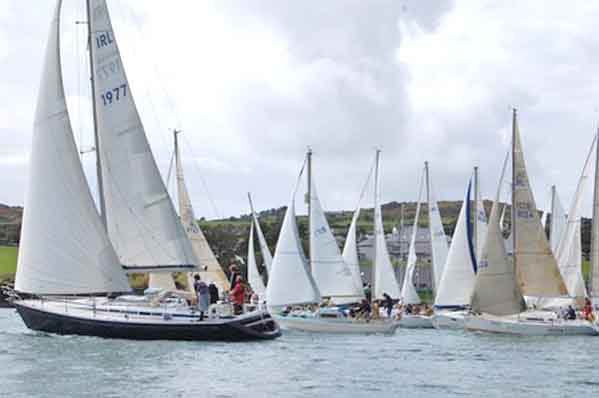 September League 2009
September League 2009
Schull Harbour Sailing Club was founded in 1977 as a summer sailing club and from its inception it has activately promoted leisure and competitive sailing in Schull. The first commodore was Billy Pope who had sailed in the area from the fifties in his yacht Pendua. He was joined by his brother Teddy in Harbar.
In the early seventies Billy and his crew were instrumental in setting up Cape Clere regatta on the Wednesday before Schull Regatta.
Informal racing took place during the years 75/76 until a small committee drew up the first set of club rules.
The first clubhouse was a caravan, which was parked at the back of the stone beach, close to where the public toilets are now. This was used for many years, until the upgrade of the pier.
The first trophy was presented by Sean Barnett owner of Barnett’s Hotel for a club Fastnet Rock race and is still raced for every July.
The boats in the first race in addition to the Pope brothers were Michael Murphy’s Coral Ballerina, Ronnie Goods Tundercrest, George Dwyer’s Madcap, and Frank Godsons Lyre 11.
Additional boats quickly arrived with Paul Murray and Kit Pearson each purchasing an Offshore 8. Vincent O'Farrell arrived in his Elizabethan and Pat Whelan in his large Moody ketch, Charlene. Myles Ronan moved on from the Flying Fifteens, when he purchased Kiemar, and Al Bird campaigned his GK 24.
James O'Flynn and Tom O'Brien made a regular Saturday trip from Baltimore and Bill Hilliard sailed up from Rossbrin.
The number of races increased annually as each boat owner sponsored a race, and the season now runs from May to September.
A junior racing fleet quickly grew as the large number of member’s kids took to the water, and successful leagues and sail training courses were held over the years.
The club now organizes the successful Calves Week Regatta every August, having taken over the running of the event from the local Regatta Committee, and uses the impressive Fastnet Marine Center as its headquarters.
(Details and image courtesy of Schull Harbour Sailing Club)
Schull Harbour Sailing Club, Schull, Co. Cork, or c/o Michael Murphy, Vermont, Grange Road, Douglas, Co Cork. Tel: 021 429 1878, email: [email protected]
Have we got your club details? Click here to get involved


























